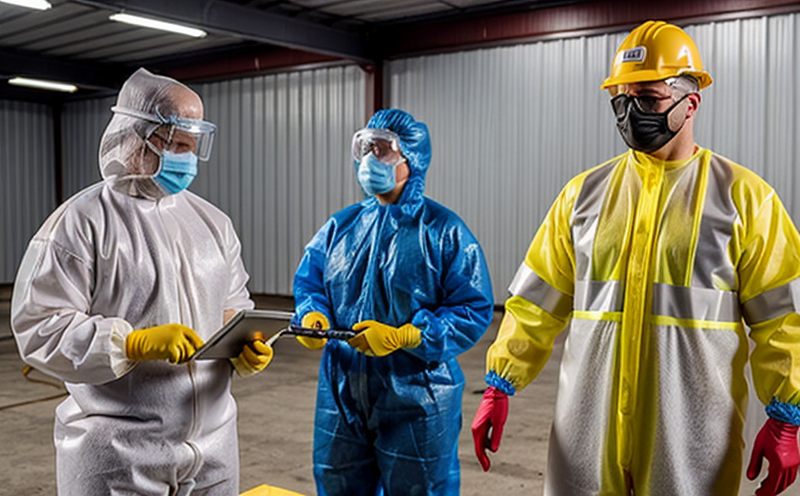UNE-EN 1149 Electrostatic Protective Clothing Testing
The UNE-EN 1149 standard is a critical framework that ensures electrostatic protective clothing (EPC) meets the necessary requirements to protect individuals from the risks associated with static electricity in various industrial environments. This testing protocol covers materials and garments designed to prevent the accumulation of static charges, ensuring they are safe for use by workers handling flammable or explosive materials.
The standard specifies the methods for assessing the electrical properties of EPCs, including their resistance to surface discharge and air-ionization. Testing is conducted on various types of clothing made from synthetic fibers that can generate significant static electricity under certain conditions. The primary goal is to ensure these garments do not pose a hazard by allowing dangerous levels of charge build-up.
In addition to the basic parameters, UNE-EN 1149 also addresses the impact of environmental factors such as humidity and temperature on the performance of EPCs. This comprehensive approach ensures that the clothing remains effective under real-world conditions. The testing process involves controlled experiments to simulate typical workplace scenarios where static electricity could pose a risk.
For compliance with UNE-EN 1149, laboratories must use calibrated equipment and follow strict protocols. Specimens are prepared according to specified dimensions to ensure accurate measurement of electrical resistance. The testing apparatus includes high-voltage generators, air ionizers, and conductivity meters. Reporting involves detailed documentation of test procedures, results, and conclusions.
Understanding the importance of this standard is crucial for quality managers, compliance officers, R&D engineers, and procurement specialists who are responsible for ensuring worker safety in industries dealing with hazardous materials. By adhering to UNE-EN 1149, these professionals can confidently select EPCs that meet stringent safety requirements.
The protocol's rigorous testing ensures that the clothing is not only functional but also safe to wear in potentially dangerous environments. Compliance with this standard enhances occupational safety and helps prevent accidents caused by static electricity discharge. This level of assurance is essential for maintaining a safe work environment and protecting employees from potential injuries or fatalities.
Why It Matters
The importance of UNE-EN 1149 Electrostatic Protective Clothing Testing cannot be overstated, especially in industries where the risk of static electricity is high. Static electricity can lead to dangerous situations such as sparks or fires when combined with flammable materials. Properly tested electrostatic protective clothing helps mitigate these risks by ensuring that garments do not contribute to charge accumulation.
- Reduces Hazards: Ensures workers are protected from the dangers of static electricity discharge.
- Enhances Compliance: Meets regulatory requirements and industry standards for safety.
- Maintains Performance: Validates that EPCs remain effective under various environmental conditions.
- Protects Workers: Provides peace of mind knowing the clothing meets strict safety criteria.
The UNE-EN 1149 standard plays a pivotal role in safeguarding workers' health and preventing accidents. By adhering to this testing protocol, organizations can ensure that their EPCs are reliable and effective, contributing significantly to overall occupational safety.
Eurolab Advantages
At Eurolab, we pride ourselves on providing the highest quality testing services for electrostatic protective clothing. Our experienced team of experts ensures that every test conducted adheres strictly to UNE-EN 1149 standards. Here are some key advantages of choosing Eurolab:
- Expertise and Experience: Our professionals have extensive knowledge in occupational safety testing.
- State-of-the-Art Facilities: Equipped with the latest technology to conduct precise tests.
- Comprehensive Reporting: Detailed reports that provide valuable insights into test results.
- Client-Centric Approach: Tailored services designed to meet your specific needs and requirements.
We are committed to providing accurate, reliable testing that meets or exceeds industry standards. Our dedication ensures that you can trust Eurolab for all your EPC testing needs.
Why Choose This Test
- Rigorous Testing: Ensures the clothing meets strict safety and performance criteria.
- Regulatory Compliance: Guarantees adherence to international standards like UNE-EN 1149.
- Precision Equipment: Utilizes high-quality instruments for accurate measurement of electrical properties.
- Detailed Reporting: Comprehensive documentation that supports informed decision-making.
- Industry Reputation: Eurolab's reputation for excellence and reliability in occupational safety testing.
- Expert Team: Highly skilled professionals dedicated to ensuring the highest standards of safety.
Choosing UNE-EN 1149 Electrostatic Protective Clothing Testing with Eurolab means you are investing in a robust solution that prioritizes worker safety and compliance. Our commitment to excellence ensures that your EPCs are not only tested but also trusted for their reliability and effectiveness.





